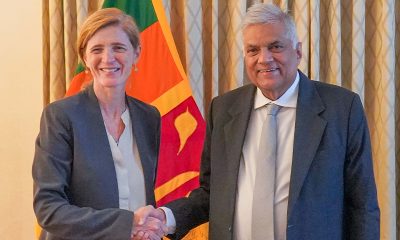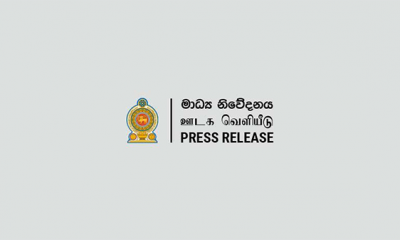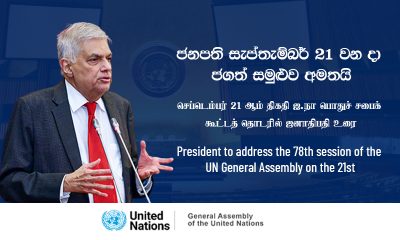Latest News
President Ranil Wickremesinghe’s address at the UNGA: ‘Sri Lanka’s journey to rebuild trust and global solidarity’

President Ranil Wickremesinghe addressed the UN General Assembly in New York on Thursday (21) on the theme “Rebuilding trust and reigniting solidarity” and its relevance to Sri Lanka’s recent challenges.
He mentioned how Sri Lanka faced significant social, economic and political challenges in the past year, including threats to democratic traditions but has managed to achieve a democratic transition.
He highlighted efforts made to stabilize the economy, including economic reforms and foreign assistance and said that his intention is to lead Sri Lanka towards sustainable recovery and growth, benefiting all segments of society and ensuring peace, prosperity and reconciliation.
The President also discusses the global geopolitical landscape, emphasizing the inter-connectedness of various challenges, such as climate change, debt and sustainable development. He stresses the need for international solidarity and climate finance, particularly for smaller, climate-vulnerable and debt-ridden countries.
President Wickremesinghe mentioned Sri Lanka’s commitment to climate action, including renewable energy goals, forest conservation and emissions reduction while expressing concern about the impact of climate change on food security, clean energy and livelihoods, emphasizing the urgency of mobilizing climate finance.
The President called on developed countries to fulfill their commitments, provide assistance and assume their share of responsibility, while underscoring the importance of restructuring the international financial system to address climate change and sustainable development.
Additionally, the President emphasized the need for reform in multilateral institutions like the UN, particularly the expansion of the Security Council’s composition and the importance of disarmament and the impact of global military expenditures.
Overall, the President’s speech highlighted the challenges faced both by Sri Lanka and the world, and emphasized the importance of solidarity, climate action, disarmament and multilateral cooperation in addressing these issues.
Following is the full speech delivered by President Ranil Wickremesinghe at the 78th session of the United Nations General Assembly;
“Rebuilding trust and reigniting solidarity“ is an appropriate point of departure not only for reflecting on the challenges before the multilateral today, but also for reviewing developments in my own country, Sri Lanka, over the past year.
At this time last year, amidst multiple global crises, Sri Lanka was experiencing its most challenging period in recent times socially, economically and politically, which had a devastating impact on people’s lives.
Even our Democratic traditions were threatened by attempts to occupy our Parliament and bring it to a halt. Nevertheless, we succeeded in bringing about a democratic political transition, due to our deeply entrenched and resilient democratic traditions.
Resorting to the re-graduation of Sri Lanka’s economy, coupled with the gift of fertilizer from the United States’ Government which led to a bumper harvest, has assisted us in ensuring stability during that period.
The reforms I have since initiated in the economic, financial, institutional and reconciliation fronts have been directed on the one hand towards rebuilding trust and confidence between the people and the government; and on the other, towards laying the foundation for economic stabilization and recovery. Sri Lankans are already witnessing the positive outcomes of these measures in their daily lives and the revival of confidence internally and externally in the progress of the country.
It is my intention to lead the country towards sustainable and stable recovery and growth which will benefit all segments of Sri Lankan society in all parts of the country, ensuring a future of peace, prosperity and reconciliation for the present and future generations of women and men. In reaching this goal, we will be accompanied by the support, trust, and solidarity of our own people and of the international community.
As we turn the corner towards the 80th anniversary of the UN and prepare for the Summit of the Future in 2024, we see the fragmented geopolitical landscape of a multi-polar world where new centers of global power have emerged.
Accompanying this systemic change, are, on one hand, great expectations of development and human progress with millions of people rising out of poverty to prosperity.
On the other hand, we see a world where former big power rivalries and geopolitical tensions have reignited in open war, overlapping with new theaters of conflict and tension on land and in the oceans. Security Alliances have expanded and recent arrangements have been formed to deal with strategic threat perceptions in old and new theaters of conflict. North-South divisions are widening with the digital divide, the financial and debt crisis and the energy transition. Contrary to the promise of 2030, today we are seeing levels of poverty and hunger not witnessed since decades.
Neutral, nonaligned countries of the global South such as Sri Lanka are once again constrained in-between new global power configurations facing those who not respect the sovereignty of our nations.
In numerous recent Declarations in the UN and beyond including at the G20 in Delhi, the BRICS in Praetoria and G7 in Hiroshima, we have agreed that our challenges are interconnected, across borders and all other divides. We must grasp the opportunity to unite in order to build an inclusive future.
It is an appropriate reflection of this current global predicament, that the theme of this year’s general debate is “Rebuilding trust and reigniting global solidarity”.
This year, in parallel with the UNGA, we have participated in three interrelated summits dealing with accelerating the SDGs, Financing for Development and Climate Ambition where we agreed that international solidarity and collective action is needed to address these simultaneously.
Cross-border financial impacts of crises such as climate change and the pandemic are impeding the ability of smaller indebted countries such as mine, to make progress on SDG’s and climate adaptation and mitigation. Conflicts and tensions among big powers are complicating the policy environment for the rest by adding uncertainty to economic and macro-financial stability, disrupting supply chains and causing inflation as well as food and energy insecurity.
Long before the SDGs, Sri Lanka had achieved high human and social development indicators which ranked us in a category well above other middle-income countries. Neither has Sri Lanka shirked its responsibility to the planet. Last year at COP27 we outlined our Climate Ambition Plan. We said that by 2030 we will have 70% renewable energy in electricity generation, increase forest cover by 32% and reduce greenhouse emissions by 14.5%. We will phase out coal by 2040, and reach net zero by 2050.
Our low carbon development trajectory gave us one of the lowest per capita carbon emission rates for a lower MIC country.
This year as a result of exogenous shocks and debt, the incremental progress we were proud to have reached has been reversed. Food inflation reached putting significant pressure on food security amongst vulnerable communities. At the same time children’s education and nutrition have suffered due to the pandemic and the economic crisis.
In parallel, last month in Sri Lanka we were grappling with the driest weather spell seen in recent years followed by torrential rainfalls.
Adverse climate outcomes spilling over onto our tight fiscal space just as we begin to stabilize from last year’s economic crisis. As a climate vulnerable developing country in debt crisis, the urgency to mobilize climate finance is greater today than it was ever before. However, despite promises made to which we were all witness, rich countries are not delivering to expectation.
Developed countries must do their part and fulfill what they agreed – assume their share of the common but differentiated responsibility, provide assistance for mitigation and adaptation and compensation for loss and damage.
National efforts alone will not suffice to ensure the success of the SDGs and reverse climate change. The need for global solidarity to restructure the international financial architecture is paramount. This is articulated loud and clear in multiple global fora including in G20, and the BRICS. The Secretary General’s SDG stimulus highlights the interconnections between the achievements of the SDGs, combatting climate change and the concrete interventions required by creditors sovereign and private, as well as by IFIs including to mitigate the debt crisis.
It is estimate that the 2008 financial crisis has cost the U.S. economy $4 trillion. Recent studies in the U.S. have stated that the impact of the pandemic on the U.S. economy from 2020 to 2024 would reach $14 trillion. These numbers would more than double if the rest of the global economy is added. We have not faced an economic crisis of this magnitude any time before in our modern history. The cost of World War 2 in today’s USD would amount to $4 trillion, and the Marshall Plan would be $ 150 billion.
This is the magnitude of the challenge before us. Therefore if we are unable to restructure the global fiscal order, then certainly we will fail in the struggle to reverse climate change and achieve the SDG goals.
There is still time for course correction as the crisis has not reached its peak. At the same time, the Paris Summit for a New Global Financing Pact will come up with the funding requirements.
Therefore, the Summit of the Future should not be crafting new programs, but re-structuring the present financial architecture to suit the needs of climate change and sustainable development.
This must be the priority of this General Assembly; we cannot afford to allow divisions to drive focus away from this crisis.
While key issues such as the Bridgetown Initiative and the necessity to address the debt of low-income countries are being discussed in this assembly, it is not commanding the attention it deserves. Unfortunately, the Security Council has failed to give priority to these connected issues of climate change, debt relief and sustainable development. This impacts the future of mankind. The survival of the planet must be our priority, we cannot afford to go into this war with a divided high command. The future of all species on the globe is dependent on our ability to put aside our rivalries until this crisis is solved.
Multilateral machinery which reflects the world of the past century needs to be reformed to meet the challenges of the present and the future, a machinery which has failed to find a solution to the longstanding Palestine question. The composition of the Security Council must be expanded to be representative of current global diversity and decision-making. In parallel, the role of the UNGA must be strengthened.
We are asking that the permanent members engage in a credible dialogue which will lead to a unified approach to combat these threats ahead of the next sessions.
While we seek solidarity and financing to alleviate poverty and climate challenges, global military expenditures have risen today to record levels reaching $2.24 trillion. This reflects the strategic trust deficit among the powerful, key arms control frameworks which were instrumental in maintaining system stability in the past have collapsed and nuclear conflict is once again under open discussion, potentially and apocalyptically triggered by autonomous control. We urge restraint in the increase of military expenditure which leads to escalation of conflict.
Developing countries have been the voice of sanity and reason in this regard for decades. In keeping with Sri Lanka’s longstanding position supportive of disarmament of WMD and nuclear weapons, this year Sri Lanka ratified the Comprehensive Test Ban Treaty. Yesterday, we acceded to the Treaty on the Prohibition of Nuclear Weapons.
The war in Ukraine has far-reaching and severe financial and humanitarian repercussions on food, hunger and debt in all parts of the world including Sri Lanka. It is recalled that the UN Charter vests on powerful states in the Security Council the responsibility to maintain international peace and security and to deescalate rather than ignite conflict.
We need to halt the momentum where this and other big power tensions are spilling over into established areas of international rules-based cooperation forged over decades of multilateral negotiation, ranging from international trade to ocean governance.
This international system is today undergoing vast changes. At the same time, it is being confronted with unprecedented challenges. We come to the United Nations to demonstrate solidarity in arriving at common solutions. What is at stake is not the future of the United Nations, but of our planet as a whole. Member States will need to find new ways of working together despite the increasing mistrust that has permeated international relations.
We who have not been able to find a solution to the Palestinian question must now be able at least to find a solution to the questions which threaten the existence of the present global community.
This can be achieved through the willingness of the permanent members to work together in solidarity with the developing world. They must show the way”
President Wickremesinghe also extended his sincere condolences to the victims and families of the natural disasters that hit Morocco and Libya in recent days and pledged solidarity with Moroccan and Libyan friends during this difficult time.
(PMD)
Latest News
‘Bloody policies’: MSF recovers 11 bodies from Mediterranean off Libya
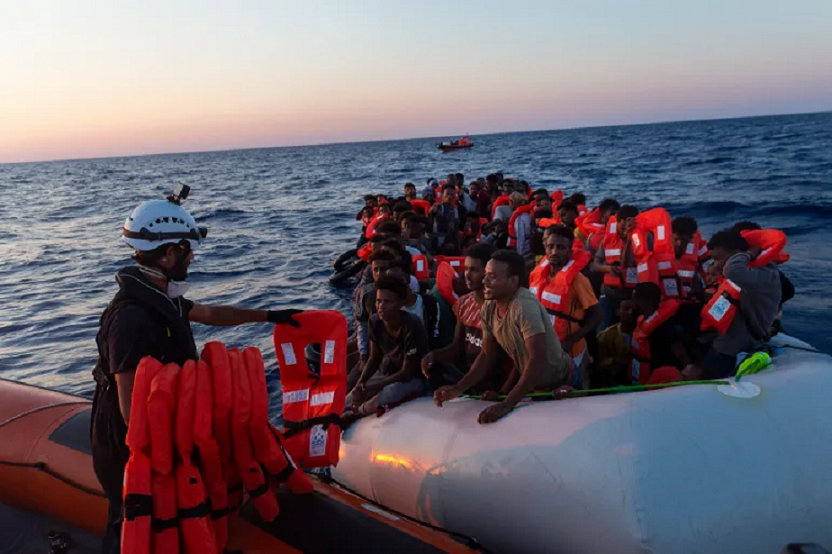
The aid group Doctors Without Borders has reported recovering 11 bodies and rescuing dozens of people off the coast of Libya as it criticised the migration policies of the North African country and European countries.
In a statement on Friday, the group, known by its French initials MSF, said its Geo Barents rescue vessel managed to recover the bodies following a search operation lasting more than nine hours after being alerted by German nongovernmental organisation Sea-Watch, which also rescues refugees and migrants.
“As we cannot determine the reason behind this tragedy, we know that people will continue to take dangerous routes in a desperate attempt to reach safety, and Europe must find safe and legal pathways for them,” MSF said in a post on X. “This catastrophe must end!”
Sea-Watch said it is unclear whether the bodies were victims of a previously unknown shipwreck, adding that they tried to contact Libya’s coastguard to go and retrieve the dead, but received no reply.
“The so-called Libyan coastguard – financed by the EU – ignored our call demanding that the bodies be recovered,” the group said.
Thousands of people trying to head from Africa to Europe use Libya as a departing point, with the Italian island of Lampedusa the nearest European destination as they undertake the dangerous journey across the Mediterranean to escape war, poverty and persecution.
Italy, which wants to put a stop to the migration stream, has said Libya and neighbouring Tunisia must do more to stop people from going to sea. It has also clamped down on the operation of the rescue ships, arguing that they encourage people to head to Europe, a charge that is denied by the charities.
Emphasising its policy on the rescue ships, Italy said on Friday that it forced the MSF rescue vessel to take the 165 people that it had saved from boats in the Mediterranean operation to the northern port of Genoa. The port was more than 650 nautical miles (1,200km) from their position and much farther than the more convenient ports in nearby Sicily, significantly delaying assistance to the rescued.
The route in the central Mediterranean is the most dangerous migrant crossing in the world, with the United Nations registering more than 20,000 deaths and disappearances in the area since 2014.
More than 3,000 refugees and migrants went missing in 2023 while attempting to use the route, according to the International Organization for Migration.
According to Italy’s interior ministry, the number of arrivals in the country has dropped in 2024 to fewer than 21,800 people since the beginning of the year, compared with close to 53,300 in the same period last year.
[Aljazeera]
Latest News
Mustafizur, Rishad, Hridoy dazzle in Bangladesh’s tight two-wicket win over Sri Lanka
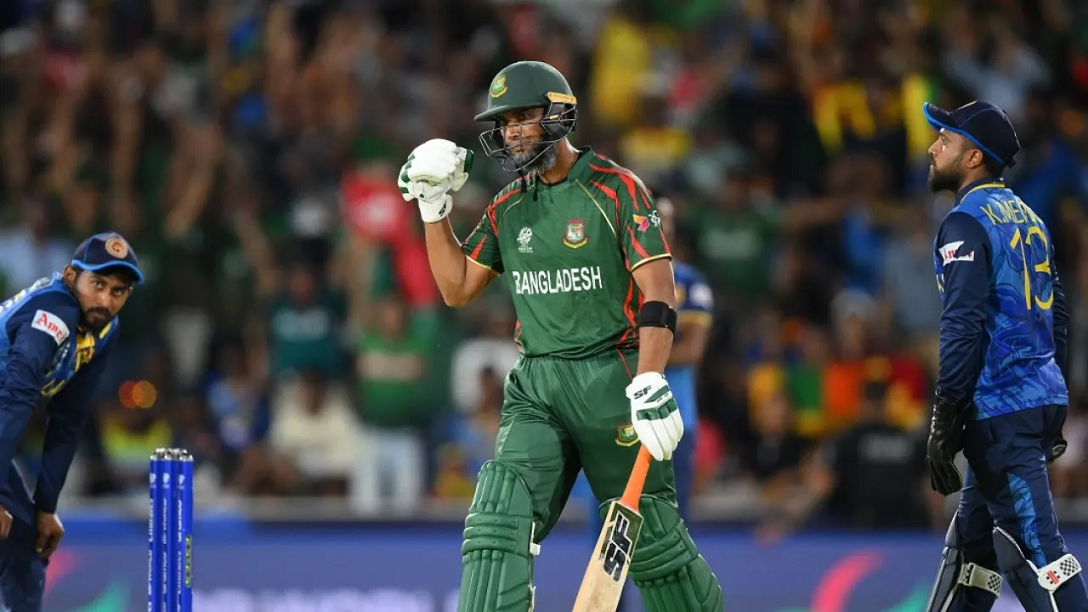
Nuwan Thushara’s last over brought Sri Lanka screaming back into the match,as he first bowled Rishad Hossain, and then nailed Taskin Ahmed in front of the stumps with a pinpoint swinging yorker. This left Bangladesh eight wickets down, with 12 runs still to get.
However, the experienced Mahmudullah was at the crease for Bangladesh, and despite some further nervy moments, pushed Bangladesh across the line off the last ball of the 19th over.
But this was a match chiefly decided by Bangladesh’s own outstanding bowling. Mustafizur Rahman was the best among them, using shorter lengths and his cutters efficiently, to claim figures of 3 for 17. Rishad Hossain’s three-for through the middle overs also kept Sri Lanka quiet.
Mustafizur was instrumental in Sri Lanka’s downward spiral through the middle overs, which culminated in a crash-and-burn end. Ultimately, their inability to find boundaries, or even rotate strike against good Bangladesh bowling resulted in their downfall. A score of 125 for 9 always seemed poor on a decent pitch, even if their bowlers made a match of it in the end.
Brief scores:
Bangladesh 125 for 8 in 19 overs (Towhid Hridoy 40, Litton Das 36; Dhanajaya de Silva 1-11, Nuwan Thushara 4-18, Wanidu Hasaranga 2-32, Matheesha Pathirana 1-27) beat Sri Lanka124 for 9 in 20 overs (Pathum Nissanka 47, Dhananjaya de Silva 21; Tanzim Hasan Sakib 1-24, Taskin Ahmed 2-25, Mustafizur Rahman 3-17, Rishad Hossain 3-22) by two wickets
[Cricinfo]
Latest News
Rashid, Farooqi and Gurbaz the stars as Afghanistan crush New Zealand

Afghanistan boosted their Super Eight chances with yet another dominating win, this time thumping New Zealand by 84 runs in Providence. Having beaten Uganda by 125 runs in their opening match, they are now at the top of Group C with a net run rate of 5.225.
After being sent in, Rahmanullah Gurbaz and Ibrahim Zadran gave Afghanistan a start of 103 in 14.3 overs. It came off the back of the 154 the pair added against Uganda, thus making them the first opening pair to register two successive century stands in the history of the T20 World Cup.
Afghanistan’s was an innings of two halves. They scored 55 for no loss in the first ten overs and 104 for 6 in the last ten, with Gurbaz contributing 80 off 56 balls. New Zealand, who had decided not to play any warm-up games, looked every bit rusty as their fielders dropped catches and missed run-out opportunities.
With the pitch assisting both seamers and spinners, chasing 160 was not going to be easy. But few would have expected New Zealand to collapse in the manner they did.
Fazalhaq Farooqi picked up three wickets in the powerplay and Rashid Khan three just after it. Eventually, both ended with identical figures of 4 for 17 as New Zealand were bowled out for 75 in the 15.2 overs. Glenn Phillips and Matt Henry were the only New Zealand batters to reach the double digits.
Trent Boult found some swing in the opening over but Gurbaz and Ibrahim showed their intent by picking up three fours off Henry from the other end. Both batters had luck on their side, too. Gurbaz got a second life when he skipped down the track to Santner and missed the ball, which went on to brush the leg stump but the bails did not budge. In the following over, Finn Allen dropped Ibrahim off Henry at the deep-square-leg boundary.
That was not all. Gurbaz got another reprieve after being involved in a miscommunication with Ibrahim. Having taken off for a single, Gurbaz had to retrace his steps and would have been run out had Conway not fumbled the throw.
Two balls later, New Zealand finally seemed to have found success when Santner pinged Ibrahim’s pads and umpire Kumar Dharmasena ruled it lbw. But the batter got the decision overturned on review as the ball was heading down the leg side. Immediately after that, Ibrahim hit Santner for an inside-out four as Afghanistan ended the powerplay on 44 for no loss.
New Zealand went against the prevailing wisdom of not bowling an offspinner when two right-hand batters at the crease, and Michael Bracewell repaid that faith by conceding only six off his first two overs.
Lockie Ferguson was even more frugal, going for five in his first two. He could have had Ibrahim off a slower full toss but a leaping Kane Williamson failed to pull off a one-handed stunner at mid-off. That meant while Afghanistan remained unscathed, they had only 55 on the board after ten overs.
Afghanistan had not hit a single six in the first ten overs, but there were five in the next three, including three in one Bracewell over as Gurbaz and Bracewell stepped on the accelerator. The pair took the side past 100 in the 14th over. New Zealand finally broke through when Ibrahim bottom-edged a short ball from Henry onto his stumps, after having been hit on the grille on the previous delivery.
Promoted to No. 3, Azmatullah Omarzai played his part with 22 off 13, which included two sixes in three balls off Henry. Mohammad Nabi fell for a first-ball duck but Gurbaz kept finding the boundary at regular intervals. However, a three-wicket, three-run final over by Boult kept Afghanistan to 159.
Farooqi gave Afghanistan a dream start with the ball. With the very first delivery of the innings, he uprooted Finn Allen’s leg stump as the ball moved in late. In the seamer’s next over, Conway pushed at one that seemed to come slower off the surface and was caught at extra cover.
The decision to give Farooqi a third over in the powerplay brought further rewards. This time, bowling around the wicket to Daryl Mitchell, he got a length delivery to just straighten and take the outside edge. Gurbaz took a regulation catch to complete the dismissal and leave New Zealand 28 for 3.
It could have been worse for New Zealand. In between, Naveen-ul-Haq had rapped Kane Williamson’s front pad after the batter had moved across to play a delivery. Afghanistan sent it upstairs for an lbw review but the umpire’s call saved the New Zealand captain.
Afghanistan did not have to wait too long for Williamson’s wicket. Rashid brought himself on after the powerplay and struck straightaway as Williamson guided one to first slip. But Rashid was just warming up. In his next over, he dismissed Mark Chapman and Bracewell off successive deliveries to leave New Zealand on 43 for 6. Chapman went for a pull and got bowled; Bracewell was late to bring his bat down and was lbw.
Phillips was New Zealand’s last hope. He did hit a couple of boundaries but was soon caught at long-on when he tried to take on Nabi. That ended any hopes of revival New Zealand might have had.
Brief scores:
Afghanistan 159 for 6 in 20 overs (Rahmanullah Gurbaz 80, Ibrahim Zadran 44, Azmatullah Omarzai 22; Trent Boult 2-22, Matt Henry 2-37, Lockie Fergusoan 1-28) beat New Zealand 75 in 15.2 overs (Glenn Phillips 18; Rashid Khan 4 for 17, Fazalhaq Farooqi 4 for 17, Mohammad Nabi 2-16) by 84 runs
[Cricinfo]


